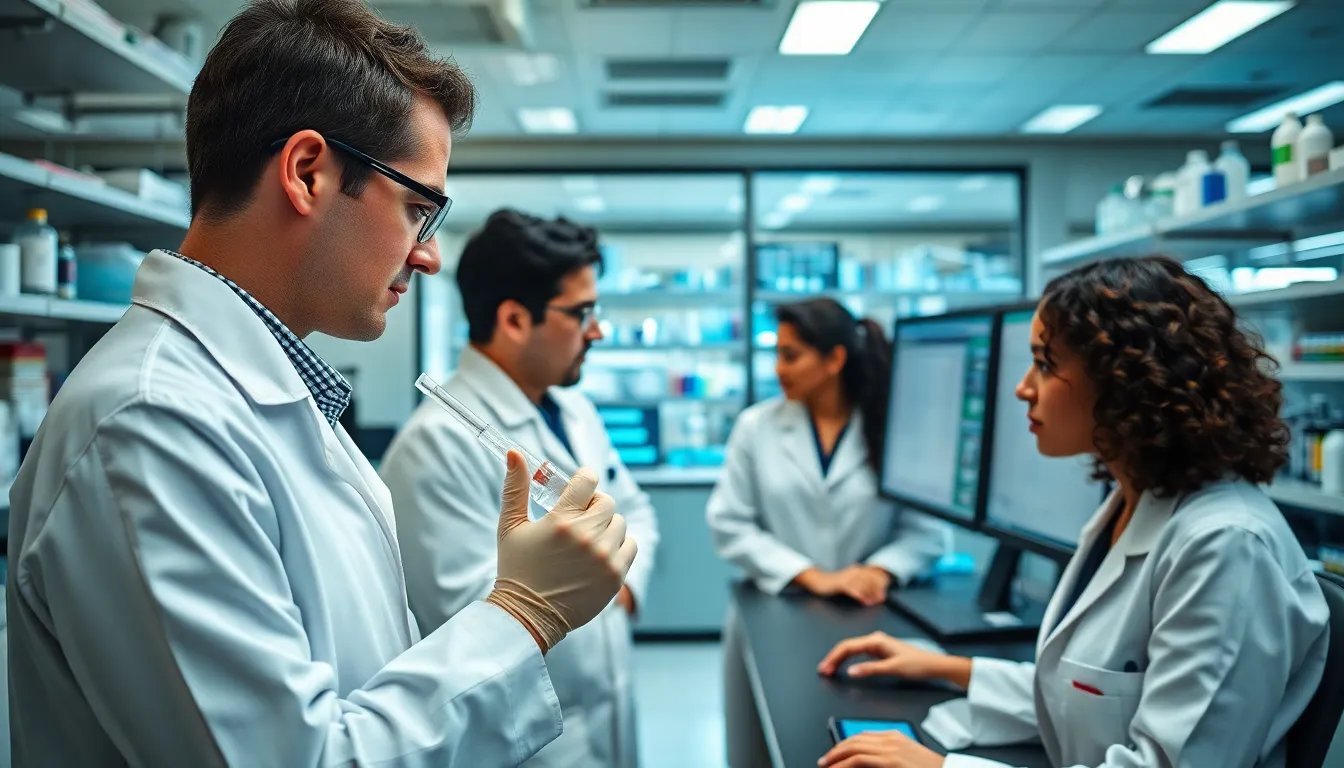In a world where science fiction is becoming science fact, American biotech labs are leading the charge. These innovative powerhouses are not just brewing potions in test tubes; they’re crafting the future of medicine, agriculture, and even environmental solutions. Picture a lab where scientists wear lab coats and safety goggles, but instead of serious faces, they’re sporting grins as they unlock the secrets of life itself.
Table of Contents
ToggleOverview of American Biotech Labs
American biotech labs serve as pivotal hubs for scientific discovery and innovation. These facilities specialize in a range of fields, including pharmaceuticals, genetic engineering, and agricultural biotechnology. Through their research and development efforts, they contribute to advancements that enhance health outcomes and sustainable practices.
Innovation processes often involve collaboration among researchers, universities, and private companies. This cooperation facilitates the exchange of ideas, resources, and expertise among various stakeholders. Many labs focus on specific areas such as vaccine development, disease research, and biomanufacturing technologies.
Investment in biotech research remains robust, with significant funding allocated from both public and private sectors. In 2020, investments in U.S. biotech reached over $23 billion, indicating strong confidence in the industry’s growth potential. As a result, many American biotech companies often emerge as leaders in global markets, driving advancements in science and health.
Biotech labs frequently host cutting-edge technologies like CRISPR and synthetic biology. These tools enable scientists to edit genes and create new organisms with specific traits. Consequently, breakthroughs in agricultural biotech enhance food security and promote environmentally friendly practices.
Additionally, collaborations with regulatory agencies ensure compliance with safety standards and facilitate the approval of new products. Such oversight promotes public trust in biotechnology while maintaining ethical practices. The dynamic environment of American biotech labs positions them as key players in addressing global challenges in health, food production, and environmental sustainability.
Key Players in the Industry

American biotech labs host a range of influential companies and innovative startups, driving significant advancements in the biotech sector. These entities play a crucial role in shaping the industry’s future.
Major Companies
Leading biotech firms include Amgen, Genentech, and Gilead Sciences. Amgen specializes in biologic therapies, contributing to cancer and kidney disease treatments. Genentech focuses on personalized medicine, revolutionizing how diseases are addressed. Gilead Sciences is renowned for its antiviral drugs, particularly in HIV and hepatitis C. Collectively, these companies generated over $100 billion in revenue in 2020, highlighting their substantial market influence. Their commitment to research and development enhances the effectiveness of treatment options and ensures ongoing innovation in the field.
Emerging Startups
Numerous startups are emerging in the American biotech landscape, each bringing fresh ideas and technologies. For instance, CRISPR Therapeutics utilizes gene editing to develop new therapies for genetic diseases. Moderna gained attention for its mRNA technology, significantly impacting vaccine development. Another notable player, Synlogic, focuses on engineered live bacteria for treating diseases. Many of these startups secure funding from venture capital investments, raising nearly $10 billion collectively in 2020. Their agility and innovative approaches position them as vital components of the biotech ecosystem, driving transformation across various fields.
Innovations in Biotechnology
American biotech labs lead in pioneering breakthroughs that transform healthcare and agriculture. Researchers continually engage in cutting-edge studies, utilizing advanced technologies and innovative methodologies to drive development. They collaborate across various sectors, enhancing research and development efforts through partnerships with universities and private companies.
Research and Development
Research and development programs focus on addressing pressing global challenges. These programs emphasize genetic engineering and sustainable agricultural practices. American biotech labs produced numerous therapies that improved patient outcomes, leveraging over $23 billion in investment from 2020. Collaborations among major firms and emerging startups foster a rich environment for discovery, promoting advancements in personalized medicine and biologic therapies.
Breakthrough Products
Breakthrough products emerge from these labs, addressing unmet medical needs and advancing food security. Notable products include mRNA vaccines, which played crucial roles in combating infectious diseases. Companies like Amgen and Moderna pioneered therapies that achieved remarkable success, generating substantial revenues exceeding $100 billion collectively in 2020. Innovations also include CRISPR technologies, which streamline genetic modifications, enhancing agricultural resilience. American biotech labs consistently push the boundaries of science, offering solutions that significantly impact global health and environmental sustainability.
Regulatory Landscape
The regulatory landscape plays a crucial role in shaping the operations of American biotech labs. Compliance with stringent regulations ensures safety and efficacy in biotechnological advancements.
FDA Regulations
The Food and Drug Administration (FDA) governs the approval process for new biotech products. Biotech companies must navigate rigorous testing and review procedures before their drugs reach the market. Preclinical and clinical trials are mandatory steps that assess safety and effectiveness. The FDA’s oversight not only promotes public safety but also enhances manufacturer accountability. Additionally, expedited pathways exist for breakthrough therapies, allowing faster access to innovations. Laboratories collaborating closely with the FDA gain insights into regulatory expectations, streamlining their processes and improving timelines for product development.
Ethical Considerations
Ethical considerations significantly impact research and development in American biotech labs. Scientists adhere to guidelines that prioritize patient safety and informed consent. Transparent communication with stakeholders builds trust in biotechnological innovations. Genetic engineering raises unique ethical questions about potential long-term effects on ecosystems and human health. Regulatory bodies encourage ongoing dialogue around these issues, fostering responsible innovation. Furthermore, ethical frameworks guide the responsible use of technologies like CRISPR, ensuring that advancements align with societal values. Labs committed to ethical practices demonstrate a commitment to the welfare of the public and the environment.
Industry Challenges
American biotech labs face numerous challenges that impact their operations and growth. Both funding and market competition significantly influence their ability to innovate and thrive.
Funding and Investment
Funding remains a critical challenge for American biotech labs. Despite the impressive $23 billion invested in biotech research during 2020, securing ongoing financial support can be complex. Rising costs for research and development often strain available resources. Investors increasingly seek assurances of returns, prompting biotech firms to demonstrate clear market potential. Startups, despite raising nearly $10 billion in venture capital in 2020, encounter difficulties in maintaining a steady flow of investment. Established companies must also effectively manage their funding strategies to sustain ongoing projects and drive breakthrough innovations.
Market Competition
Market competition poses another significant hurdle. The landscape features established giants like Amgen and Gilead Sciences, each generating revenue exceeding $100 billion in 2020. This dominance can overshadow emerging firms attempting to carve out their niches. Innovators must differentiate themselves to attract attention in a crowded space. Fast-paced technological advancements frequently result in intense competition, especially in areas like vaccine development and personalized medicine. Collaborations among entities can enhance competitiveness, but staying ahead of rivals remains a persistent challenge for American biotech labs.
American biotech labs are not just shaping the future of science but are also addressing some of the world’s most pressing challenges. Their innovative spirit fuels advancements in medicine and agriculture while promoting sustainable practices. The collaboration between established companies and emerging startups fosters a vibrant ecosystem that thrives on creativity and discovery.
As these labs continue to push boundaries through cutting-edge technologies, they remain crucial in transforming ideas into tangible solutions. With robust investments and a commitment to ethical practices, American biotech is poised to lead the global market in the years to come. The ongoing dedication to research and development ensures that the potential for groundbreaking discoveries is limitless.



